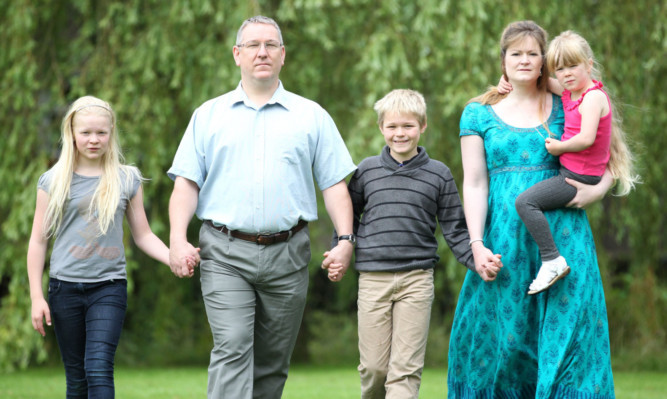The father of a tragic toddler has criticised lawmakers for failing to ban the blinds that claimed her life.
Little Muireann McLaughlin died in 2008 after becoming entangled in the looped cord of the roller blind in her home in Menstrie in Clackmannanshire.
Within 20 seconds the two-year-old was dead and despite her father fighting for 40 minutes to revive her, she could not be saved.
The toddler’s siblings Cian, now nine, and 11-year-old Aoife both witnessed their sister’s death, and mum Kate arrived home with daughter Aine to find her husband performing CPR on Muireann.
Following the accident Sheriff David Mackie called for the blinds to be outlawed but, five years later, the law has yet to be changed.
In that time a further 16 children have died in the same way.
Muireann’s father Angus, a radiographer with the NHS, criticised the delay. He said: “We found out to our cost how dangerous they are.
“Most countries in Europe don’t use these blinds, so it seems we are left out because Europe isn’t interested. It angers me because children are still dying. They need to be banned.”
He added that his other children had been badly affected by the events of that day. It has left a huge hole in our family,” he said. “Cian and Aoife still have vivid memories of the day. It has really affected them.
“There is no getting over it, really. Some days even getting out of bed is difficult, it put a strain on our marriage. We are still trying to get it all together.”
Some firms have since ceased selling the blinds, however it’s estimated that they are fitted in around 200 million homes across the UK.
Current EU laws dictate that blinds are sold with a safety device to prevent cords coming loose, such as cleats to allow householders to tuck them away or break connectors which snap when weight pulls on them.
But many people do not use the cleats, leaving cords to dangle freely.
A spokesman for the European Commission said it took the risk presented by looped cords “very seriously”.
He said: “Future voluntary standards will require that internal blind cords do not form loops that pose a risk of strangulation to small children and that, if needed, the adequate safety devices are supplied.
“EU member states are free to introduce national regulatory rules, provided they first present their draft legislation to the Commission to ensure national rules do not create unjustified barriers on the internal market.”
While the law is set to be updated so that from next year all blinds are fitted with break connectors, there are still some concerns that this will not be enough. The MP for Ochil and South Perthshire, Gordon Banks, said: “These measures are not going to solve the problem and the accident awareness campaigns are well and good but the death rate has not gone down. A redesign is the only way to keep kids safe in their own homes.”
Sheila Merrill, of safety group ROSPA, said manufacturers were now beginning to produce blinds without looped cords following extensive campaigning.
